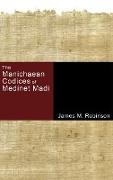The Manichaean Codices of Medinet Madi
BücherAngebote / Angebote:
The seven Manichaean papyrus codices of the fourth or fifth century were discovered in illicit excavation in 1929 in the Egyptian desert. They were acquired in about equal halves by A. Chester Beatty for his library and by Carl Schmidt for the papyrus collection of the Staatliche Museen of Berlin. Having had access to the inventories, correspondence, and files in Berlin, Robinson provides translations of the German and French documents to increase access to information previously unavailable to the scholarly community. He narrates the slow and problem-ridden path of the acquisition, conservation, and editing of these important works, including their movements between dealers, collectors, scholars, and the military in Egypt, London, Dublin, Berlin, Schondorf, Gottingen, Warsaw, Leningrad, Los Angeles, Claremont, and Copenhagen.
"This book is about one of the most sensational discoveries of ancient manuscripts made in the twentieth century, and the manifold obstacles their conservation and reading ran into. It contains the results of Robinson's meticulous research in the fate and inventories of the various parts of this collection, which even historians of religion are often not familiar with. . . . [T]his thoroughly researched survey . . . is a welcome source of information for scholars . . . not only for those working on the manuscripts but also for the broader range of historically interested people who are going to use these sources."
--Wolf-Peter Funk, editor of the Berlin Coptic Manichaean manuscripts
James M. Robinson is Professor of Religion Emeritus at Claremont Graduate University, where he was founder and director of the Institute for Antiquity and Christianity. As permanent secretary of UNESCO's International Committee for the Nag Hammadi Codices, he edited The Coptic Gnostic Library, reprinted in five volumes (2000), among his many other publications is Language, Hermeneutic, and History.
Folgt in ca. 15 Arbeitstagen



